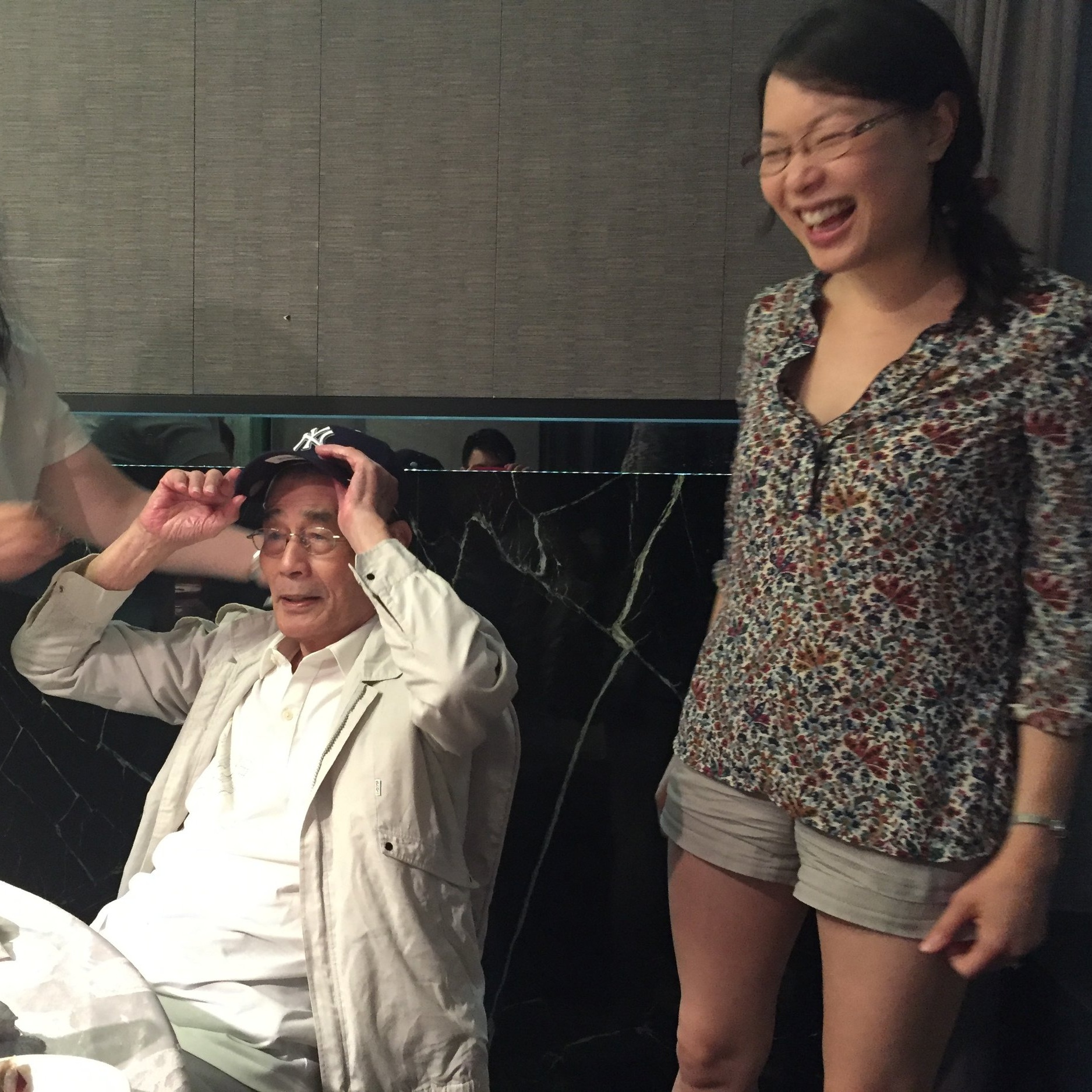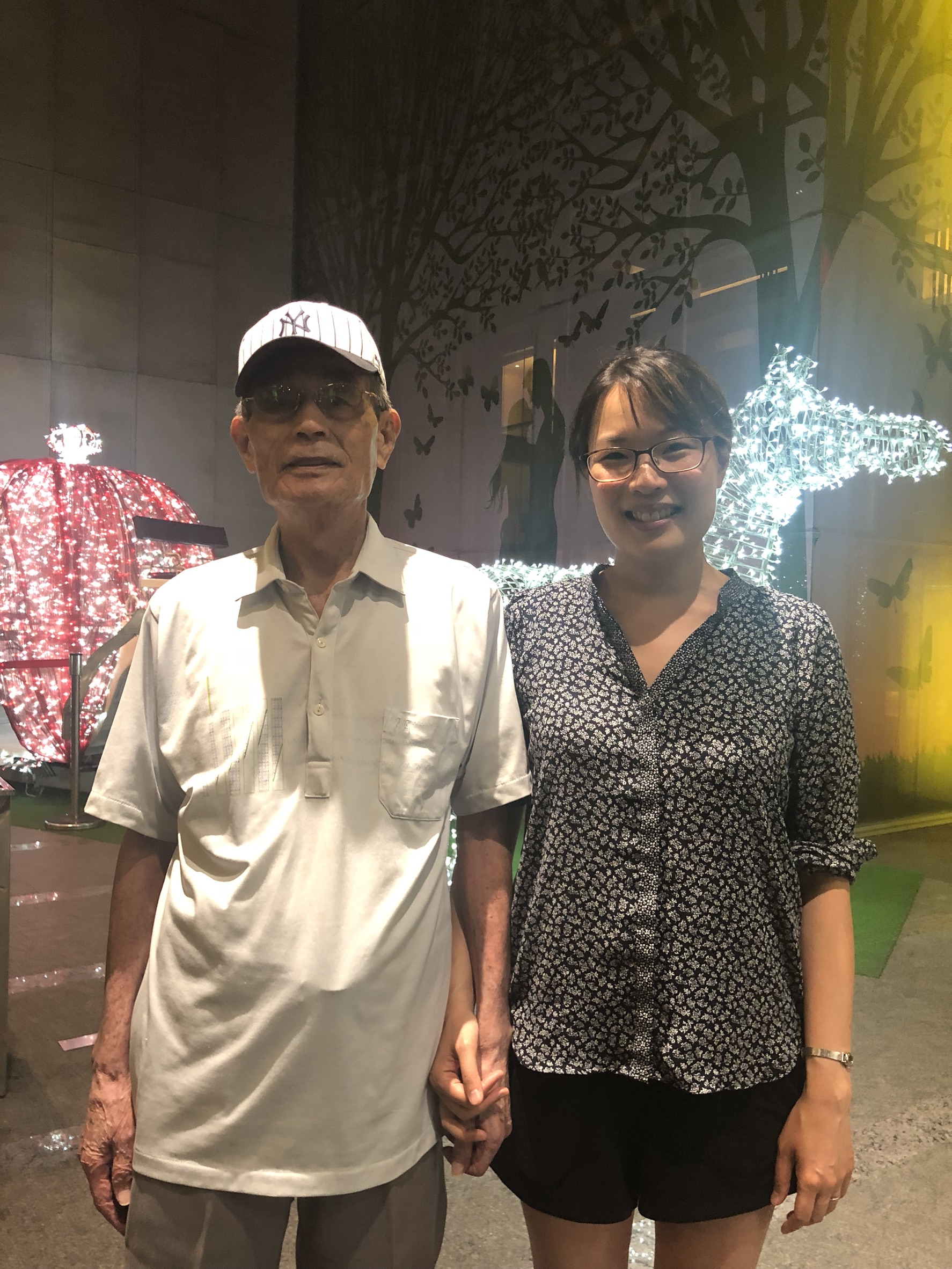The Ambiguous Loss of the ABC
/In Taiwan, back when everyone was just a bit younger.
The cleaving of my family tree from its ancestral roots may have happened over forty years ago, but it hit me just today over my kitchen counter. Even I was surprised when the tears fell. Why now? A few days earlier, we found out (in true modern fashion) via iMessage from Taiwan that we had just lost my maternal grandfather (ah gong). At the time, I said, “Oh that’s sad,” and then carried on with my day. Or at least I thought I did. But my subconscious knew better -- family is never that simple.
I know less about my grandfather’s life than I know about my morning Starbucks barista. It sounds crazy, but I honestly couldn’t write out his Chinese name for you. I know that he grew up in Taiwan under Japanese occupation. That fact alone accounts for most of the rest of what I know about him: he loved baseball, especially the New York Yankees; he spoke and wrote Japanese better than Chinese, and he sang Sakura with the indoctrinated enthusiasm of a schoolboy. The physical aspects I gleaned from the handful of times I saw him in person: he wore plain buttoned shirts, he slicked his hair back, his face was usually stern and unsmiling. From relatives, I learned supporting details: that he hadn’t attended much school because he had to work from an early age, that he worked hard in restaurants, and that he kept a daily journal (in Japanese). That’s about it.
How can you mourn a relationship you never had? Can you even mourn a person that you didn’t really know? Am I allowed to mourn a connection that I did not nurture?
When I ask that last question, I think of the relatives who stayed in the old country and had the burden and privilege of taking care of my grandparents, of living daily life with them, and of no doubt hearing their old-timer stories countless times. They are the ones who put in the work that family bonds require, the nurturing and the resolution of conflicts and the sharing of experiences that are the building blocks of any close relationship. Can I lay claim to any of those building blocks? These are my questions to bear, because my parents were the first branches of their respective trees to stretch this way. They are the only branches I have known in any living detail. The rest, despite being real people and my closest of kin, exist mostly as as-yet uncovered stories.
I know I am not alone in the desire to know more about my roots. I think psychology will someday come up with a term for this human sehnsucht, which seems near universal. There is no better evidence for this yearning than the popularity of DNA testing from companies like 23 and Me, which promise that the power of science will reveal FROM WHENCE WE CAME. Truth be told, the data they purvey is no mere intellectual curiosity — it has important ramifications for the very basis of one’s identity. It can inform who we believe we are, explain why we feel a certain way about ourselves and our loved ones, and we hope, even heal the wounds of the past. There are so many stories of people -- seeking a parent or an identity or confirmation of a family lie or omission -- who use these services and find a bit of information that completely upends the story they’ve known their entire lives. It can be devastating to have your world turned upside down; and yet, we still want to know.
We want to know so badly that watching other people find their roots makes for good TV. Finding Your Roots on PBS, hosted by Henry Louis Gates Jr., guides the show’s guests, usually the rich and famous, through their family histories, connecting personal stories with fascinating vignettes from world history, whether scenes from the slave trade in the New World, examples of espionage in WWII, or interactions between the huddled masses arriving at Ellis Island. It’s fun to watch, but for me it’s also been somewhat painful, because the language barrier means that it would be much harder for the production team to do a story on a Chinese person. The only Asian I’ve seen profiled is Aziz Ansari, courtesy of the English records of the British Empire in colonial India.
This language barrier is the source of an enormous cloud of guilt over so many of us ABCs (American-born Chinese). The Chinese ability of your typical ABC does not approach the level you need to foster relationships. Mine certainly doesn’t. I could barely talk you through how to make a peanut butter and jelly sandwich in Chinese (what’s the word for peanut butter? I took two years of college Chinese and I don’t know). Expressing emotions is hard enough within an Asian upbringing; finding the words from a foreign language to do so is nigh impossible. So my conversations with my grandparents consist of me babbling like a toddler, while my adult psyche drips with the guilt that I should be able to do better.
I highly suspect that a big part of my loss is guilt. After all, it is the guilt that wracks us most after a loss, is it not? The could-have-beens, the should-have-beens, the why-didn’t-I’s. Yet, fortunate as I am to not be hardened to loss, even I know that guilt succors no one in these times. It helps my grandfather not a whit. It helps me celebrate his life none, and it is a burden that no one put on my shoulders.
Part of the grieving process for me is to put the guilt in its place by acknowledging that I can do nothing other than live the life I was given. The life I was given started out as someone’s dream, that of a better life, of economic mobility, of higher learning and the payoff of hard work. And for all of that I am grateful. But how could I embody all of that and still have a close relationship with people an ocean away, in a language that is no longer my own? You can’t have it both ways. I certainly can’t, and couldn’t, and part of this reckoning is telling myself that fact enough times to forgive myself for something that was never my fault.
I think what all of this — the guilting and the attempted un-guilting — is telling me is that I do have a part in this loss. Over the past few days, my throat unexpectedly closes whenever I realize that I did have some relationship to my grandfather, that I did know him and that he did know me. People have been digging up pictures as we prepare to say our final goodbyes, and most of the pictures of me were from our one big family trip to Taiwan when I was 12. There are pictures of my brother and me with my grandfather, smiling over a cake, hiking in a grove of bamboo, at a big banquet table. These photos bring back memories, memories of how he always called me by my childhood name, “An-An”; memories of how, like him, I seem to subsist on instant noodles and tea. Memories in turn, bring feelings, such as a feeling of kinship with him because I too have a habit of journaling, though not daily like his (he kept the diary out in the open, fully knowing none of us could read it). I remember the feeling of heartbreak when I returned to Taiwan years later for my grandmother’s funeral and my aunt reported that on the day my grandmother died, he stopped writing. “What’s the point, when the person you love is gone?” she had said, calmly but devastatingly. From these feelings emerges knowledge: I know that he loved his family, near and far, and wanted us to be happy together.
Family, no doubt, was extra precious to him. I found out in my twenties that my grandfather had been given by his birth parents to another family, during an era in which childrearing was dictated more by economic than emotional considerations. I found out that his adoptive family later had a baby boy, and that he loved that brother fiercely. I only saw them together once, and my grandpa was beaming the entire time with the biggest smile I have ever seen on his face. He loved us fiercely too, even if we didn’t know it, apparently keeping the photos we sent over from the States in neatly organized photo albums, making note in his journal anytime my mom called home, staying up to date on all we were doing, even if we hadn’t heard his voice in years. The last time my brother visited, my grandpa, with great effort, took my brother out to his favorite soup shop, loving him through food rather than words, as is the Taiwanese way.
I remember the last three times I was lucky enough to see him, when I (by no plan of my own) married a violinist who regularly played in Taiwan. I tagged along on these concert tours, and each time, we made sure to have one dinner with my grandpa, in his 90s by then. I brought him a Yankees cap each year, and he immediately took off his current hat and tried it on, fidgeting with it the entire dinner until it was just right. He would ask me a few basic questions in the loud voice of an almost-deaf old person, and I would do the same, half-shouting, it seemed, in the restaurant. We’d eat, take a picture, and go our merry ways. It seemed so incomplete, so unsatisfactory to me at the time, but at this moment I recognize that it was something. It was more than many people ever get. Our separate lives intersected for a few hours, affirming to each other that we existed and that we cared, and for that I must be grateful.
Gotta get that hat just right!
What I’ve realized this week is that I have somehow always felt the stretch of the branch that reached over the ocean and planted me here. Even if never verbalized until now, I have felt the strain and the absence my entire life. I realize now with the fullness of emotion that I have mourned the loss of my grandfather my entire existence. I’m grateful that his passing comes at a time in my life when I have the perspective to do something about it. I am lucky that my eldest cousins on both sides, those who grew up with my grandparents, are women my age, and some of the most thoughtful, compassionate, kind, and giving people I know (and can write in multiple languages, including English). They are valuable branches of my tree, and I hope the years ahead afford us time and the opportunity to bring our divergent branches closer together, if not geographically, then through shared stories.
We are all living the lives we are given, but there will always be that irrepressible desire to connect to the family we were also given. It’s hard, but I’m going to try my best and forgive myself the rest.
I have no doubt that ah gong, God rest his kind soul, would approve.
Love, always.



